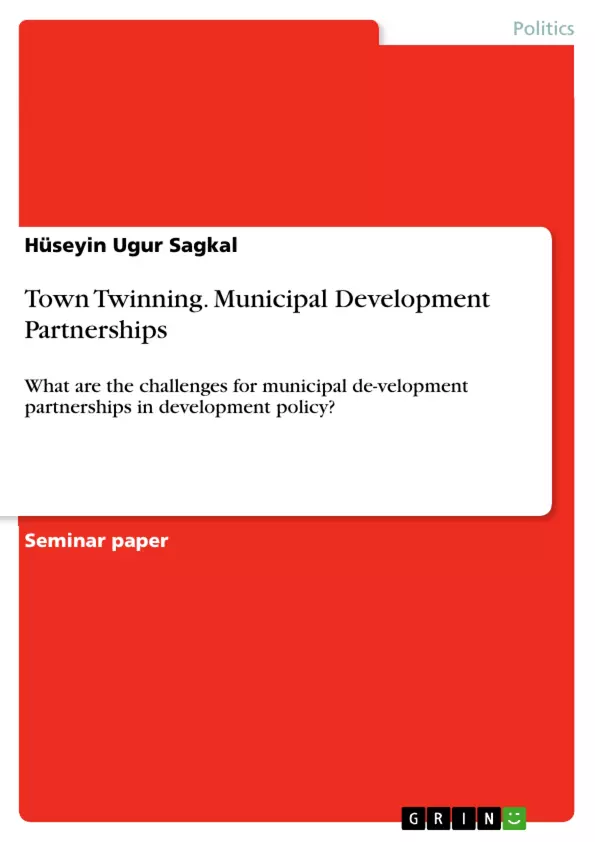"The current international system still focuses largely on the nation-state level and often does not recognize cities' independent role, but only considers them as "stakeholders." Increasingly, however, cities act alone or in associations as independent actors international relations." This German government's guideline on international cooperation for sustainable urbanization "Partners in a World of Cities" illustrates that cities (municipalities) are becoming increasingly important. This applies, particularly to development policy. The unchecked population growth in the global South poses significant challenges. The German government also sees these challenges: "By 2050, global population growth will be entirely absorbed by cities. Until then, however, this growth will take place almost exclusively in emerging and developing countries. The number of people living in cities will nearly double from nearly 3 billion to over 5 billion in 2050. (www.bundestag.de) Despite this development, development aid is only slowly adapting to these new challenges. Municipal development partnerships have not yet moved into the focus of researchers either.
The following paper, therefore, aims to examine town twinning in the context of development policy.
Inhaltsverzeichnis (Table of Contents)
- Introduction
- Current State of Research
- Central Definitions
- European and German Development Partnerships in the Global South
- Networks for municipal development work
- SKEW as a competence center for municipal development policy in Germany
- Municipal development work in Germany using examples
- Problems and obstacles of municipal development partnerships
- Conclusion
Zielsetzung und Themenschwerpunkte (Objectives and Key Themes)
This paper examines the potential of town twinning for development policy, focusing on German municipalities. The research question explores the opportunities that municipal development partnerships offer for development policy. The paper aims to demonstrate the potential of these partnerships in effectively addressing the challenge of urbanization in developing countries.
- Municipal development partnerships as a tool for development policy
- The current state of research on town twinning and development partnerships
- The role of German municipalities in international development cooperation
- Challenges and obstacles faced by municipal development partnerships
- Opportunities for strengthening and expanding municipal development partnerships
Zusammenfassung der Kapitel (Chapter Summaries)
- Introduction: The introduction establishes the significance of municipal development partnerships in the context of global urbanization and development policy. It highlights the growing role of cities as actors in international relations and the need for development aid to adapt to these changes.
- Current State of Research: This chapter discusses the limited research on town twinning and municipal development partnerships, emphasizing the lack of systematic data collection and the dearth of dedicated studies. It highlights key works in the field, focusing on Franco-German twinning and the transnational contributions of municipalities to international security.
- Central Definitions: The chapter defines key concepts like town twinning and municipal development partnerships, contrasting them with other forms of inter-municipal collaboration like ring twinning and city sponsorships. It emphasizes the partnership-based nature of twinning, open to all social groups, and rooted in mutual agreement and equal rights.
- European and German Development Partnerships in the Global South: This chapter explores the network of European and German development partnerships, focusing on organizations and institutions dedicated to municipal development work. It introduces the SKEW (Competence Center for Municipal Development Policy in Germany) as a key player in promoting and facilitating such partnerships.
- Municipal Development Work in Germany using examples: The chapter provides concrete examples of municipal development work in Germany, illustrating the various forms and approaches taken by German municipalities in their international development collaborations.
- Problems and obstacles of municipal development partnerships: This chapter discusses the challenges and obstacles faced by municipal development partnerships, examining the practical difficulties and potential limitations encountered in implementing successful partnerships. It highlights areas for improvement and identifies potential solutions for addressing these challenges.
Schlüsselwörter (Keywords)
Key terms and concepts explored in this paper include town twinning, municipal development partnerships, development policy, urbanization, global South, international cooperation, city networks, competence centers, sustainable development, and Local Agenda 21. The research focuses on German municipalities and their role in fostering development partnerships with cities in the global South, analyzing both the opportunities and challenges associated with such collaboration.
Frequently Asked Questions
What is town twinning?
Town twinning is a partnership-based collaboration between municipalities from different countries, rooted in mutual agreement and shared social goals.
How do municipal partnerships support development policy?
They act as a tool for international cooperation, helping to address global challenges like urbanization and sustainable development in the global South.
What is the role of SKEW in Germany?
SKEW (Competence Center for Municipal Development Policy) serves as a key player in promoting and facilitating international partnerships for German cities.
Why is urbanization in the global South a challenge?
By 2050, global population growth will be concentrated in cities in developing countries, requiring rapid adaptation of infrastructure and aid.
What are the obstacles to successful town twinning?
Practical difficulties include lack of resources, systematic data collection gaps, and the slow adaptation of traditional development aid to municipal levels.
What is Local Agenda 21?
It is a local action plan for sustainable development, often used as a framework for municipal development partnerships.
- Quote paper
- Hüseyin Ugur Sagkal (Author), 2020, Town Twinning. Municipal Development Partnerships, Munich, GRIN Verlag, https://www.grin.com/document/956785



